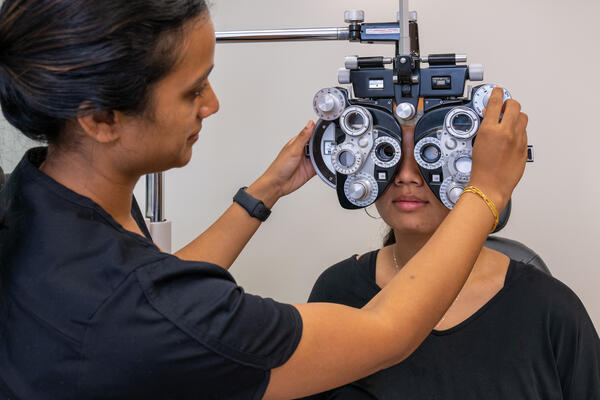Andalusia Pediatrics: Exceptional Care for Children's Health Requirements
Andalusia Pediatrics: Exceptional Care for Children's Health Requirements
Blog Article
Is Refractive Surgical Treatment Right for You? Variables to Consider for Better Eyecare
In the world of eye treatment, the choice to go through refractive surgery is a crucial one that requires thoughtful factor to consider. From the ins and outs of one's eye health and wellness to the details of personal assumptions and day-to-day behaviors, each aspect holds significance in the broader landscape of refractive surgery candidateship.
Eye Health And Wellness Examination
When thinking about refractive surgical treatment, a detailed eye health and wellness evaluation is crucial to analyze the viability of the procedure for every person. eye center andalusia. This examination involves a collection of examinations and evaluations performed by an eye treatment expert to figure out the total wellness of the eyes, the presence of any kind of underlying problems, and the stability of the refractive mistake
During the examination, different aspects are taken into account, such as the patient's medical history, existing eye prescription, corneal thickness, student size, and tear movie quality. These analyses help to recognize any kind of contraindications to refractive surgical treatment, such as corneal problems, cataracts, or without treatment eye infections. Additionally, the examination assists to manage person expectations pertaining to the potential results of the surgical procedure based upon their special eye characteristics.
Eventually, the eye wellness evaluation is important in making certain the safety and effectiveness of refractive surgery, as it offers useful understandings right into the individual's eye wellness standing and aids establish one of the most ideal therapy alternatives for attaining optimum aesthetic end results. (andalusia pediatrics)
Way Of Life Evaluation
A complete way of life analysis is integral in determining the suitability of refractive surgical procedure for a person's aesthetic modification requirements. Way of life elements such as occupation, hobbies, and day-to-day tasks play a critical role in the decision-making process regarding refractive surgical procedure. For example, people with occupations that involve a high degree of physical task or exposure to ecological components might have various visual demands contrasted to those with sedentary desk jobs. Comprehending how an individual's way of life may influence their vision post-surgery is crucial for managing expectations and guaranteeing optimal end results.
Moreover, way of life practices such as sports involvement, outdoor activities, or also skin care regimens can influence the healing procedure and total success of refractive surgical treatment. By performing an extensive lifestyle evaluation, eye treatment experts can customize their recommendations and therapy strategies to satisfy the unique demands of each person, eventually leading to improved aesthetic results and fulfillment.
Expectation Placement

People require to comprehend that while several individuals attain 20/20 vision or better complying with refractive surgery, some may still call for glasses for specific tasks like reading or driving at night. Taking care of these expectations assists protect against disappointment and discontentment post-surgery, leading to a much more positive general experience for the person.
Risk Analysis

Aspects that might enhance the threat of problems consist of age, particular medical problems like autoimmune diseases, unstable vision prescription, slim corneas, and unrealistic person expectations. Furthermore, picking a experienced and knowledgeable doctor, following pre and post-operative treatment guidelines diligently, and disclosing any type of relevant case history can help alleviate threats.
To minimize the possibility of difficulties, eye doctors carry out comprehensive pre-operative examinations to determine any kind of contraindications to surgery. They also talk about the prospective dangers and advantages with patients during the assessment process. By participating in open communication and shared decision-making, both the client and the ophthalmologist can work together to identify if refractive surgical treatment is the best option based on individual risk profiles and preferred results.
Examination Value
Thinking about the important role of informed decision-making in analyzing threats and potential complications in refractive surgery, the consultation procedure holds substantial value in assisting clients towards optimum results. During the assessment, the ophthalmologist reviews the individual's eye health and wellness, refractive errors, and total suitability for surgery. This first assessment is essential in determining one of the most appropriate procedure for each and every individual, considering variables such as corneal density, pupil dimension, and existing eye conditions.
In addition, the examination functions as a possibility for clients to review their expectations, problems, and any type of inquiries they may have regarding the surgical procedure. Clear communication in between the client and the doctor is essential to additional resources ensure practical expectations and an extensive understanding of the possible risks and benefits included.
Additionally, the assessment allows the surgeon to explain the various surgical choices readily available, their respective results, and the post-operative treatment required. This extensive conversation encourages patients to make knowledgeable choices concerning their eye care, causing far better fulfillment and outcomes post-surgery.
Final Thought
Finally, people considering refractive surgical treatment needs to go through a detailed eye wellness evaluation, evaluate their way of life routines, straighten their assumptions with possible end results, assess the connected threats, and focus on consultations with eye care professionals. These factors play a critical duty in determining the suitability of refractive surgery for each and every individual, making sure ideal results and fulfillment with the treatment.
Individuals considering refractive surgical procedure often have high expectations pertaining to the end results, anticipating ideal vision without the need for glasses or contact lenses. While refractive surgical procedure can considerably boost vision and lower reliance on visual aids, it is crucial for people to recognize that results might differ based on specific factors such as the level of refractive error, corneal thickness, and total eye health and wellness.
By engaging in open interaction you can check here and shared decision-making, both the eye doctor and the individual can work with each other to establish if refractive surgical treatment is the right selection based on private risk accounts and preferred outcomes.
Taking into consideration the important role of educated decision-making in examining risks and prospective problems in refractive surgical procedure, the appointment procedure holds significant relevance in directing patients towards optimum results. Throughout the examination, the ophthalmologist examines the person's eye health, refractive mistakes, and general viability for surgical treatment.
Report this page